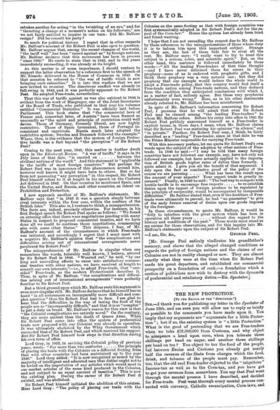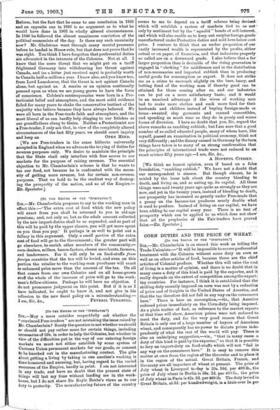THE NEW PROTECTION.
[To THE EDITOR OP TEE" SPECTATOR.")
SIE,-I thank you for publishing my letter in the Spectator of June 13th, and am sure you will allow me to reply as briefly 'as possible to the comments you have made upon it. You imply that my arguments are "arguments for a little Protec- tion " ; but if so, the existing system is "a little Protection." What is the good of pretending that we are Free-traders when we take 231,000,000 from Customs, and why object to ninepence a head upon corn, when you tolerate three shillings per bead on auger, and another three shillings Per head on tea ? You object to tax the food of the people, but between Excise and Customs you already get nearly half the revenue of the State from charges which the food, drink, and tobacco of the people must pay. Remember, too, that the old real Free-trader objected to the "iniquitous " Income-tax as well as to the Corn-tax, and you have got to get your revenue.from somewhere. You say that Peel went through the mental process I have described, and decided for Free-trade. Peel went through every mental process con- nected with currency, Catholic emancipation, Corn-laws, and
Reform, but the fact that he came to one conclusion in 1826 and an opposite one in 1846 is no argument as to what he would have done in 1903 in wholly altered circumstances. In 1846 he followed the almost unanimous conviction of the political economists of the day. Is there any such unanimity now 1' Mr. Gladstone went through many mental processes before he landed in Home-rule, but that does not prove that he was sight You think I have forgotten that preferential duties r are advocated in the interests of the Colonies. Not at all. I
know that the mere threat that we might put on a tariff frightened Germany into withdrawing her threat against Canada, and (as a letter just received says) is probably worth to Canada half-a-million a year. I know also, and you know too, from Lord Lansdowne, that the threat is not against Canada alone, but against us. A maxim or an opinion continually pressed upon us when we are young grows to have the force of conscience. Cobden's contemporaries were born in a Pro- tectionist belief and atmosphere, and the most solid evidence failed for many years to shake the conservative instinct of the majority who believe because they have always believed. We were all born in the Free-trade faith and atmosphere, and the most liberal of us can hardly help clinging to our fetishes as our grandfathers clung to theirs. Neither a Protectionist nor a Free-trader, I only ask that, in view of the completely altered circumstances of the last fifty years, we should court inquiry • [We are Free-traders in the sense hitherto universally accepted in England when we advocate the levying of duties for revenue purposes only. We desire to maintain the principle that the State shall only interfere with free access to our markets for the purpose of raising revenue. The essential objection to Mr. Chamberlain's scheme is that he wants to tax our food, not because he is confronted with the neces- sity of getting more revenue, but for certain non-revenue purposes. That we hold to be the readiest way of destroy- ing the prosperity of the nation, and so of the Empire— ED. Spectator.]











































 Previous page
Previous page